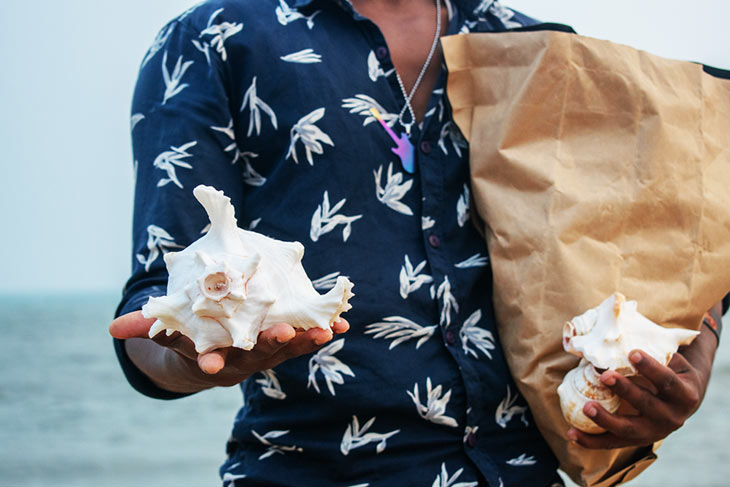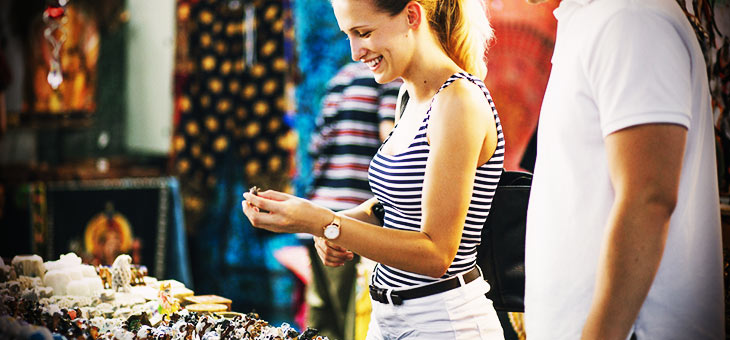Ed has always tried to bring back unusual relics from his cruising holidays, but now a friend has him rethinking his choices.
—
Q. Ed
I used to be a regular cruiser before the pandemic and I have really missed my twice-yearly chance to get away and enjoy some relaxation. I can’t wait for it to restart soon, and have my fingers crossed the government will sort out the vaccine rollout to make it happen.
Anyway, I have quite the collection of unusual souvenirs from my years of cruising to mostly Pacific destinations, but my wife and I were embarrassed when we invited some fairly new neighbours around and they seemed less than impressed by some of these souvenirs made from animal teeth and animal skins. We tried to explain that these products provided one of the only ways for the locals to earn an income off the tourism trade, but I don’t think we won them over. Is it wrong to buy animal souvenirs overseas?
Read more: Most beautiful islands around the UK and Ireland
A. There is obviously a pretty broad spectrum here with regards to what is right and what is wrong when it comes to animal souvenirs.
For example, if you have any souvenirs that are made from ivory or which come from endangered animals or caused the animals to suffer, that is a lot worse than necklaces made from teeth or bone of an animal that is killed for food or traditional purposes by the locals.
This makes it important to do research into the souvenirs that you purchase when travelling.
Read more: World’s most beautiful beaches
Some tourist souvenirs can threaten the most endangered species. You may be unaware that you are breaking the law by buying them or taking them from one country to another. For example, tabua (whale tooth) and turtle shell (marine turtle) may both be made from threatened species whose trade for personal use is prohibited.
Sometimes traders will not tell you the truth about what their product is made from or where they obtained it. If you buy something locally, it does not necessarily mean you can take it overseas.
Don’t be fooled by statements like: ‘Believe me, it’s okay’.
Read more: Experience the best of Florence
There is international policy and legislation protecting animal species from the impact of trade known as the Convention on International Trade in Endangered Species of Wild Fauna and Flora (CITES).
Animal products offered to travellers vary from country to country, with many looking like innocent items such as charms, jewellery and clothing.
Below is a list of common unethical animal souvenirs out there today, according to CITES:
Ivory and other mammal or reptile teeth and bones
One of the highest profile animal products is elephant ivory. Ivory from elephants can also be sold in the form of carved figurines, chopsticks or bangles. The appetite for ivory products fuels poaching and is responsible for pushing elephants towards extinction. Furthermore, teeth from endangered tigers, bears and crocodiles may also be sold as jewellery or as charms. Although this may seem like only a very small item, the animal may have been killed purely for it.
Coral and seashells
Coral and seashells are often used in trinkets, novelty souvenirs and decorations. Coral reefs are vulnerable to the impact of tourism. It is estimated that 20 per cent of the world’s coral reefs have already been lost. Buying products made from coral contributes to the loss of one of the ocean’s most important ecosystems. Over-harvesting of seashells has pushed some species, such as the queen conch, to the brink of extinction.

Quills, feathers and bird beaks
Quills, feathers or birds’ beaks may be used for decorative or novelty items. Many bird species around the globe are close to extinction, such as the endangered hornbills. Buying products made from their parts supports and the illegal wildlife trade.
Reptile skins
The skins of snakes and crocodiles may be used for footwear, hats, belts, handbags, wallets, and drums. Many snakes are caught in the wild and inhumanely slaughtered for their skins. As most crocodile species are now endangered, farms now breed them for their meat and skins.
Furs
Animal furs are typically found used in clothing items, but they may also be used for trinkets, ‘good-luck’ charms or in traditional materials. Furs deriving from wild animals could come from endangered wild cats and deer, which are usually caught in traps.
Turtle and tortoise shells
Turtle and tortoise shells are made into items such as combs, hair brushes, necklaces, cigarette cases, hair clips, spectacle frames and jewellery or as whole shells as decorative items.
How do you ensure the souvenirs you have purchased on holiday are ethical? Why not share your thoughts in the comments section below?
If you enjoy our content, don’t keep it to yourself. Share our free eNews with your friends and encourage them to sign up.

